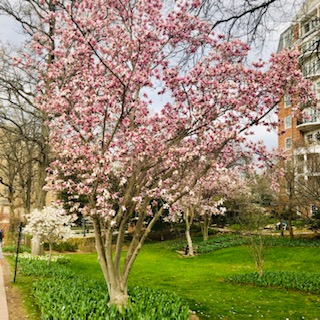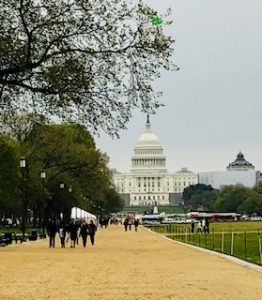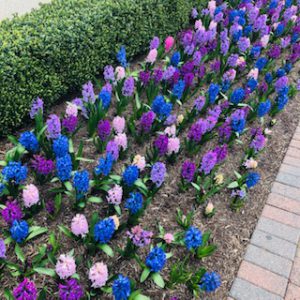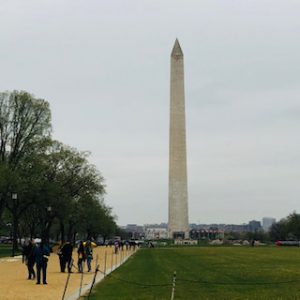
June 13, 2019, by lzzeb
Reflecting on economic geography in Washington DC
A blog by Professor Sarah Hall
In early April, I was lucky enough to attend the American Association of Geographers (AAG) annual meeting which was held in Washington DC with support from the School of Geography. The AAG conference is the largest gathering of geographers internationally across the breadth of human geography and I always come away stimulated with lots of new ideas to pursue. This was certainly helped by the sunny spring sunshine and gorgeous cherry blossoms that were out in full bloom during my visit.
My own presentation focused on my recent British Academic funded research. This project seeks to understand how and why London’s financial district has come to play an important role within the wider process of Chinese currency (the renminbi or RMB) internationalisation. In the work I presented at the conference, I explored some of the theoretical implications of this for research on the geographies of money and finance more generally. I am particularly interested in how the case of Chinese currency internationalisation might allow the development of a more political sensitive approach to understanding how financial markets are made. The work I presented forms the basis of a book chapter for a new book to be published shortly entitled The Routledge Handbook of Financial Geography that assesses the state of the art in financial geography, edited by Janelle Knox-Hayes at MIT and Dariusz Wojick at Oxford University. A range of other contributors to the book presented across several sessions and it was fantastic to reflect on the common themes that are emerging within the book as a whole. I will be certainly be adding it to the reading list for the final year module we teach here in Nottingham geography on the Geographies of Money and Finance. In the last couple of years, I’ve gradually increased the amount of material on Chinese currency internationalisation within that module and I have really enjoyed discussing the implications of RMB internationalisation for London’s financial district with our students. This is a clear example of the close links that exist between research and teaching.
The conference also gave me an opportunity to undertake some broader research related activity away from the specificities of my own research paper. A highlight for me here was to have the honour to introduce, in my capacity as one of the Editors, the Geoforum Annual Lecture. This year, this lecture was given by Professor Beverley Mullings from Queen’s University, Canada. We were joined by a fantastic set of panellists and I’m really looking forward to seeing the lecture and the commentaries published in the journal in the coming months. I was also able to connect with colleagues from outside of Nottingham – to catch up on news, share ideas and learn about new research projects. As part of these activities, I attended the Women in Economic Geography social hour. This is such a dynamic and inspirational event to discuss the future development of our sub-discipline at which I connected with old colleagues and friends as well as making new connections. Finally, I attended the board meetings of Economic Geography and Geoforum. For me, the most interesting part of these meetings is to reflect on how changing publishing practices are beginning to play out within scholarly publishing and the implications of this for geography in general and economic geography in particular. Having the space and time to think about new developments, in my own research, in economic geography, in academic publishing and in academic labour are some of the most beneficial aspects for me of attending conferences. I am selective in the conferences I attend, particularly in terms of managing the domestic planning needed for me to be away for a number of days, but after all the busy preparations at home and at work, I always return to Nottingham enthused about the academic community of which I’m a part.
No comments yet, fill out a comment to be the first




Leave a Reply